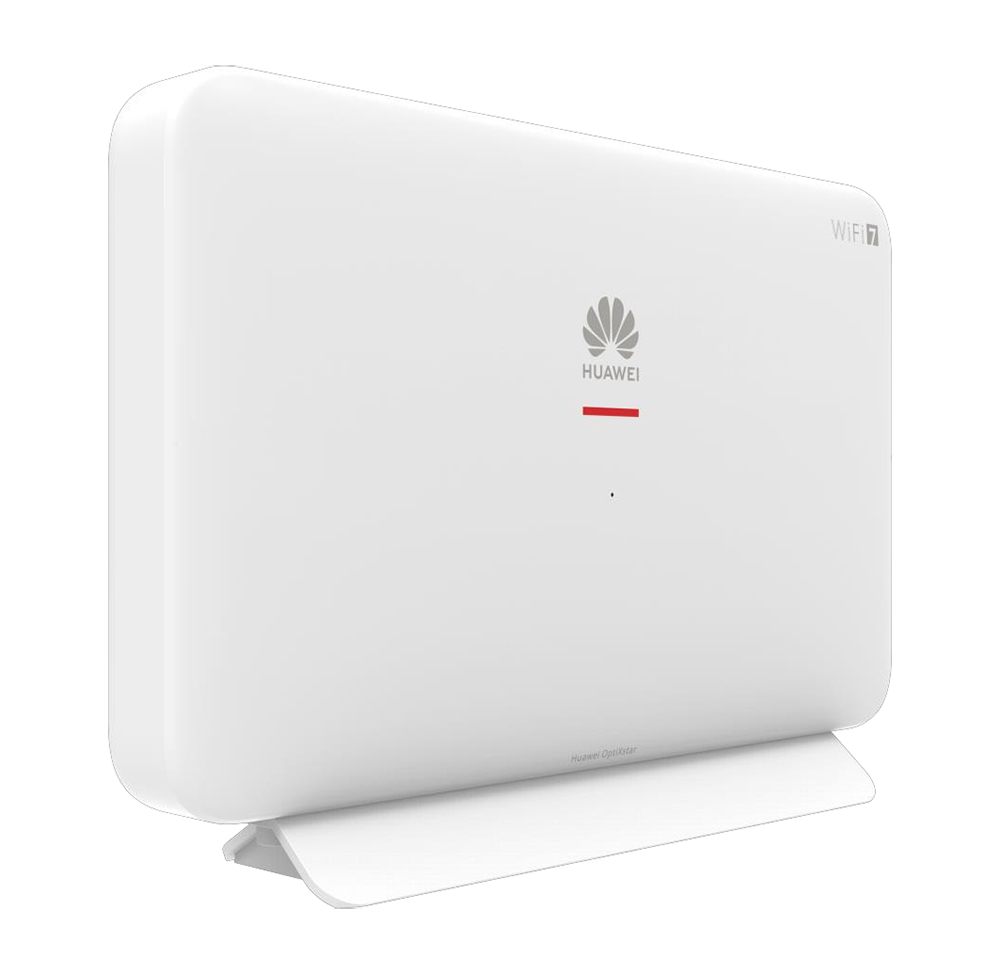-
€
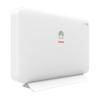
The Huawei OptiXstar EN8145B7Ns is an ONT customer terminal designed for XGS-PON networks. Optical transmission is handled by an SC/APC connector, and the receiver sensitivity is -28 dBm. The device supports standard 10/10 Gb/s symmetrical transmission. The terminal can transmit a Wi-Fi 7 wireless network, using IEEE 802.11 b/g/n/ax/be protocols in the 2.4 GHz band and IEEE 802.11 a/n/ac/ax/be in 5 GHz. The maximum theoretical Wi-Fi throughput is 688 Mbps in 2.4 GHz and 2882 Mbps in 5 GHz, respectively. The terminal provides higher wireless network speeds than standard Wi-Fi 6 solutions with 2x2 MIMO.
The device is equipped with 1x2.5G Ethernet port (10/100/1000/2500 Mbps) and 3x1G Ethernet ports (10/100/1000 Mbps). You can offer subscribers 2.5 Gb/s packages with the possibility of real-time achievement of such throughput. Additionally, the terminal has 1 POTS port for connecting an analog phone and 1 USB 2.0 port. The housing is adapted for vertical placement on a stand or wall mounting.
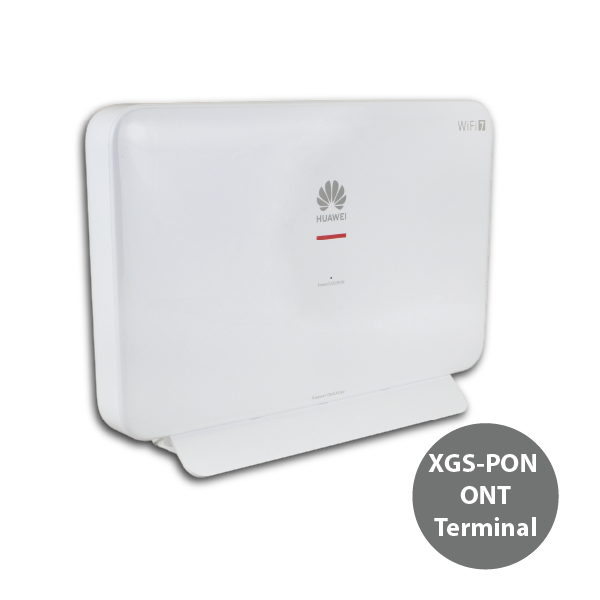
XGS-PON ONT Terminal
The offered product is a customer terminal designed for use in XGS-PON networks. It features an SC/APC optical connector with an N2-class laser, and its reception sensitivity is -28 dBm.
The device supports the XGS-PON standard, providing symmetrical bandwidth (download and upload) of 10 Gb/s. It ensures very high network speeds while maintaining an attractive price.
Wi-Fi 7 BE3600
The device can transmit a Wi-Fi 7 wireless network and supports IEEE 802.11 b/g/n/ax/be protocols in the 2.4 GHz band and IEEE 802.11 a/b/ac/ax/be in the 5 GHz band. The maximum theoretical bandwidth is 688 Mb/s at 2.4 GHz and 2882 Mb/s at 5 GHz. This speed meets the expectations of most subscribers, allowing for a comfortable internet experience.
Wi-Fi 7, apart from functions known from previous generations, introduces two important innovations - Multi-RU and MLO. Multi-RU allows a single user to be assigned more than one Wi-Fi resource unit (RU), which optimizes the network. Situations where a given resource unit is not assigned to any user disappear. MLO (Multi-Link Operation) allows devices to simultaneously transmit and receive data on multiple bands (in this case, 2.4 and 5 GHz). This allows for a significant improvement in throughput compared to older Wi-Fi 6 / Wi-Fi 6E standards, where at any given time, the client was connected to only one band.
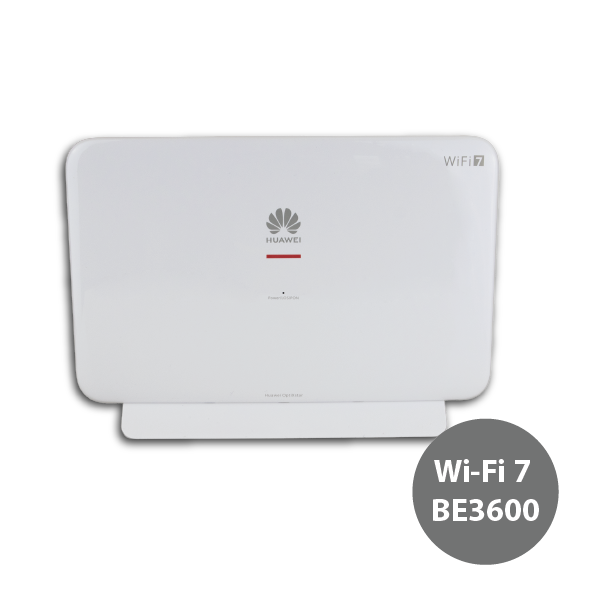
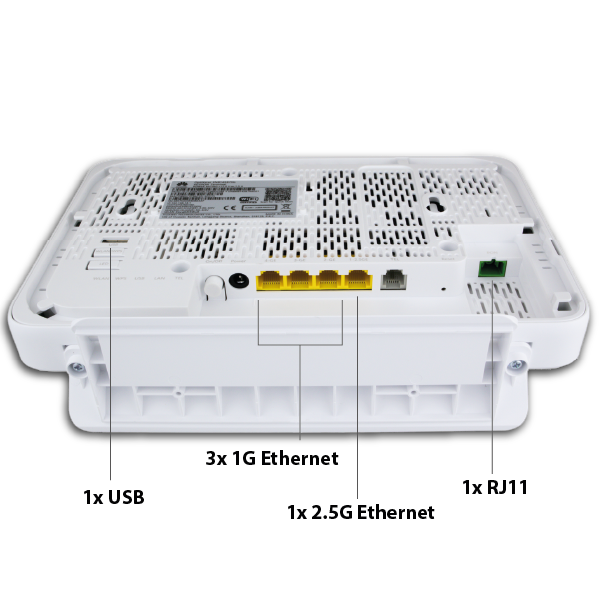
1x 2.5G Ethernet port, 3x 1G Ethernet ports, 1x RJ11 port, 1x USB port
The ONT terminal is equipped with one 2.5G Ethernet port, allowing you to offer subscribers data packages of up to 2500 Mb/s. This is more than twice the speed offered by standard GPON/EPON networks. The remaining three ports support a 1 Gb/s bandwidth.
Additionally, the device features an RJ11 (POTS) telephone port, useful if you provide VoIP telephony services. The USB port allows users to create a file server or share printers, among other functionalities.
Start using XGS-PON
XGS-PON technology offers much higher bandwidth than GPON (10/10 Gb/s instead of 2.5/1.25 Gb/s) and a larger split - 1:256 (GPON supports a 1:128 split). You can connect more subscribers to a single optical port, which is a very important feature in locations with many potential customers.
With the EN8145B7Ns, you can implement XGS-PON in FTTH networks. The device is only slightly more expensive than standard ONTs designed for GPON transmission. The 2.5G Ethernet port and the modern Wi-Fi 7 standard will ensure very high service quality, which will translate into subscriber satisfaction. By investing in XGS-PON solutions, you are investing in the future of your network.
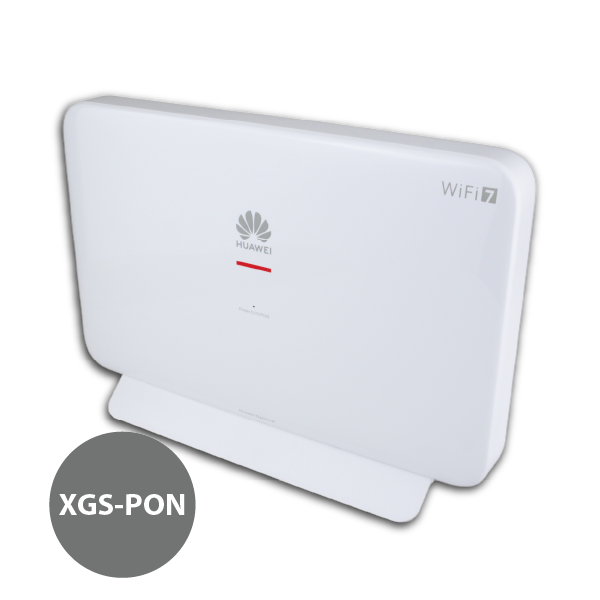
Specifications
| Huawei EN8145B7Ns | |
| Main Parameters | |
|---|---|
| Dimensions (H x W x D) | 157 mm x 250 mm x 30 mm (excluding the base) |
| System power supply | 12 V DC, 1,5 A |
| Power adapter input | 100 - 240 V AC, 50/60 Hz |
| Installation mode | Vertically placed on a desk or mounted on a wall |
| Operating temperature | 0°C ~ +40°C |
| Operating humidity | 5%–95% RH, non-condensing |
| NNI (WAN) | XGS-PON |
| UNI (LAN) | 1x 2.5GE, 3x GE, 1x POTS, 1x USB 2.0, Wi-Fi 7 |
| Optical connector | SC/APC |
| Memory | 128 MB Flash, 512 MB RAM |
| Indicator |
Indicator on front panel (POWER+LOS+PON integrated) Indicators on rear panel: WLAN/WPS/USB/LAN/TEL |
| Właściwości interfejsów | |
| XGS-PON port | Class N1/N2/E1 Receiver sensitivity: -28 dBm Wavelengths: 1260–1280 nm upstream, 1575–1580 nm downstream Upstream and downstream rate: 9.953 Gbit/s upstream, 9.953 Gbit/s downstream Wavelength blocking filter (WBF) Flexible mapping between GEM Port and TCONT SN/Password/SN+Password/Bi-directional authentication based on OMCI Upstream and downstream FEC SR-DBA and NSR-DBA |
| Ethernet port | Ethernet port-based VLAN tags and tag removal 1:1 VLAN, N:1 VLAN, or VLAN transparent transmission QinQ VLAN Limitation on the number of learned MAC addresses MAC address learning GE port supports 10 Mbit/s, 100 Mbit/s and 1000 Mbit/s auto-adaptation 2.5GE port supports 10 Mbit/s, 100 Mbit/s, 1000 Mbit/s and 2500 Mbit/s auto-adaptation |
| WLAN | IEEE 802.11 b/g/n/ax/be (2.4 GHz) IEEE 802.11 a/n/ac/ax/be (5 GHz) 2×2 MIMO (2.4 GHz&5 GHz) Antenna gain: 5 dBi WMM (Wi-Fi Multi Media) Air interface rate: 688 Mbit/s(2.4 GHz); 2882 Mbit/s(5 GHz) 4096 QAM 160 MHz frequency bandwidth WPA3/WPA2/WPA1 WPS Multiple SSIDs MU-MIMO MLO (Multi-Link Operation) Multi-RU |
| POTS port |
Maximum REN: 4 |
| USB port | USB2.0 FTP-based network storage File/Print sharing based on SAMBA DLNA function |
| Product Function | |
| Smart Interconnection | Smart Wi-Fi coverage SIP/H.248 auto-negotiation Any port any service Parental control |
| Smart service | Scheduled Wi-Fi shutdown Smart Wi-Fi sharing: Portal/802.1x authentication; SoftGREbased sharing |
| Smart O&M | IPTV video quality diagnosis eMDI Rogue ONT detection and isolation from the OLT Call emulation, and circuit test and loop-line test PPPoE/DHCP simulation testing WLAN emulation |
| Common O&M | OMCI/Web UI/TR069 Variable-length OMCI messages Dual-system software backup and rollback |
| Multicast |
IGMP v2/v3 proxy IGMP v2/v3 snooping MLD v1/v2 snooping |
| Security | SPI firewall Anti-DOS attack Filtering based on MAC/IP/URL addresses |
| Layer 3 features | PPPoE/Static IP/DHCP NAT/NAPT Port forwarding ALG, UPnP DDNS/DNS server/DNS client IPv6/IPv4 dual stack, DSLite and IPv6 SPI Static/Default routes Multiple services on one WAN port |
| Home network feature | Visualized home network management User-defined bandwidth allocation Wi-Fi optimization & Wi-Fi roaming Wi-Fi O&M intelligent identification and antiinterference |
| QoS | Ethernet port rate limitation 802.1p priority SP/WRR/SP+WRR Broadcast packet rate limitation |






 Polski
Polski English
English Italiano
Italiano Español
Español Čeština
Čeština Српски
Српски Deutsch
Deutsch Ελληνικά
Ελληνικά Slovenský
Slovenský

